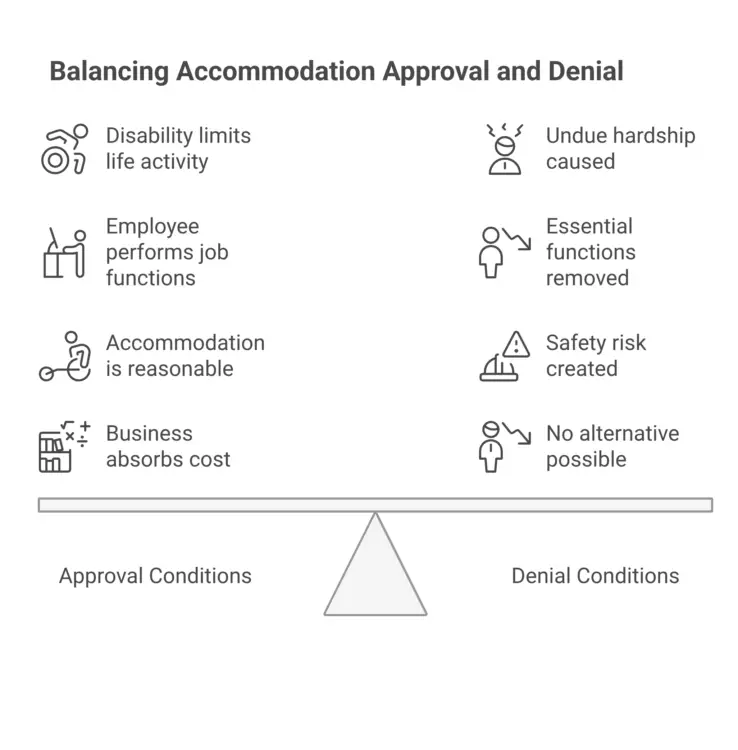
When (and Why) Employers Can Legally Deny Disability Accommodations
U.S. Disability Rights at Work: A Reference Point for Global Practice – Note for UK and International Readers
While this article focuses on the Americans with Disabilities Act (ADA), which applies to employment practices in the United States, it can still offer useful context when comparing global approaches to workplace disability rights. Looking at how other countries structure their laws and employer responsibilities helps highlight both gaps and strengths in local systems.
Many employees assume that if they have a disability and ask for accommodations, their employer is required to say yes. But that’s not always how the law works. The Americans with Disabilities Act (ADA) gives disabled workers strong protections—but it also gives employers the right to say no under certain circumstances.
That doesn’t mean a denial is always fair. But not every denial is illegal, either.
If you’ve been told no after requesting a workplace accommodation, here’s what you need to know about what the law actually requires, what it allows employers to deny, and how to respond when you think something’s off.
Not Every Accommodation Has to Be Granted
The ADA protects qualified employees with disabilities. That includes people with physical or mental impairments that limit major life activities. It also requires employers to provide reasonable accommodations when those changes would help the person do their job.
But that doesn’t mean every request has to be approved.
An employer is only obligated to provide accommodations that are reasonable and do not place an undue burden on the business. If a request would disrupt “essential” operations or go far beyond what’s manageable for the company, the law doesn’t require it.
The key question becomes: was the denial based on a lawful reason—or a misunderstanding (or worse, discrimination)?

What Makes an Accommodation Request Legally “Reasonable”
To qualify for protection under the ADA, a request has to meet a few basic standards.
A Qualifying Disability
The law doesn’t cover short-term conditions or vague discomfort. To be protected, the condition has to substantially limit a major life activity—such as walking, seeing, hearing, communicating, or concentrating.
Being Able to Do the Job
Even with a disability, you have to be able to perform the job’s essential functions, with or without an accommodation. If the job requires lifting heavy objects and that’s unavoidable, the employer may not be required to remove that task.
The Accommodation Must Be Reasonable
Reasonable workplace accommodations might include:
- Modified work schedules
- Physical changes to the workspace
- Reassignment to a vacant position
- Job restructuring that doesn’t remove core duties
What counts as “reasonable” varies by employer, industry, and job. The same request might be doable at a large company but not at a small business with tight staffing.
Legal Reasons an Employer May Deny a Request
If an employer says no, they need a valid reason, not just discomfort or inconvenience. Here are the most common legal grounds for denial.
Undue Hardship
Undue hardship means the request would create significant difficulty or expense relative to the size and resources of the business. A small shop with five employees may not be able to approve the same changes a nationwide company could.
Undue hardship isn’t just about cost. It can also include requests that:
- Disrupt how work gets done
- Require eliminating essential job functions
- Interfere with safety policies
Employers are required to explain why the hardship is real, not just assumed.
Essential Job Functions Would Be Removed
No employer has to eliminate a task that’s central to the position. For example, if a delivery driver can no longer drive, the company doesn’t have to turn the role into a warehouse job.
That said, employers have to consider reassignment to other available jobs if the person is qualified.
Safety Concerns
If the accommodation would pose a direct threat to the employee or others—and no alternative can reduce the risk—the employer may decline the request.
This is especially true in high-risk environments or where the requested change would interfere with established health and safety protocols.
What Employers Are Supposed to Do Instead of Saying “No”
Even if an employer believes they can’t approve a request, they can’t just shut the conversation down.
Under the ADA, they’re expected to participate in what’s called the interactive process. That means they should:
- Review the request in good faith
- Ask questions if something’s unclear
- Propose alternatives if the original idea doesn’t work
A flat-out no without any discussion could be a problem, especially if no explanation is given or other solutions aren’t considered.
How to Respond If Your Request Is Denied
If you’re told no, it doesn’t mean the conversation is over. You have every right to push for more information and possibly a better solution.
Ask for a Written Explanation
A written explanation of the denial gives you a clear record of why the decision was made. It also helps if you need to show the Equal Employment Opportunity Commission (EEOC) later. The following are a few questions you can ask in the explanation:
- What part of the request was considered unreasonable?
- Was any alternative accommodation considered?
- Did the employer determine there was an undue hardship?
Suggest a Modification
Maybe your original request was too expensive or hard to implement. Could a smaller change still help? Ask to explore other options.
For example:
- Swapping a full remote schedule for hybrid
- Asking for break modifications instead of a shorter day
- Using existing equipment with small changes rather than requesting new purchases
Employers aren’t required to accept every proposal, but they are expected to engage.
When a Denial Crosses the Line
Sometimes a rejection really does violate the law. You’re not expected to be a legal expert, but there are signs that the denial wasn’t legitimate.
Red Flags:
- No written response or explanation
- Refusal to consider documentation or engage in a discussion
- Patterns of denying every accommodation request across the board
- Sudden discipline or reassignment after making a request
- Hostile tone, jokes, or dismissiveness related to your condition
It doesn’t take a slur or outburst for discrimination to happen. A process that excludes you without consideration may still be unlawful.
What the Law Says About Employer Responsibilities
The ADA doesn’t just say employers should consider accommodations. It outlines specific expectations.
They are required to:
- Evaluate requests in good faith
- Communicate with the employee in a timely and respectful manner
- Provide accommodations unless they can show why they can’t
- Maintain confidentiality about the medical condition involved
Employers who guess, assume, or base decisions on stereotypes are not complying.
According to Conn Maciel Carey, a law firm that advises employers on ADA compliance, even when accommodations are denied, those decisions have to be backed by documentation and grounded in the specific demands of the job, not vague discomfort or budget talk.

The firm notes that employers frequently make mistakes when they treat accommodation as an all-or-nothing issue, rather than an ongoing process.
That’s why asking questions and keeping a record can make a big difference.
What You Can Do If You Believe the Denial Was Illegal
If you’ve followed up and still feel like the process wasn’t fair, you have options.
Escalate Internally
If your manager didn’t take your request seriously, reach out to HR or someone higher up. Some companies have disability accommodation coordinators or legal departments that can review the decision.
Make the communication clear and respectful. Keep it documented.
File an EEOC Complaint
You have a limited time to file—usually 180 days from the denial. You don’t need a lawyer to file, though legal guidance can help if your case is complex.
Once you file, the EEOC may:
- Request a response from your employer
- Mediate the dispute
- Investigate further
- Issue a right-to-sue letter if discrimination is found
Retaliation for filing is also illegal. If you experience negative treatment after raising concerns, that’s a separate violation.
Denials Happen—But They Shouldn’t Be the End
A denied request doesn’t mean you did something wrong. It doesn’t mean you have no options. It just means that it’s time to ask the next question, clarify the response, or look for alternative ways to meet your needs.
The ADA gives you the right to be heard, not just once, but throughout the process.
If your employer refuses to consider the issue or keeps shutting you out, don’t assume there’s nothing more you can do. Documentation, persistence, and the right guidance can make all the difference.
About the Author
Doug Walker is a 20-year SEO veteran and founder of iOutrank, where he helps organisations—from global brands like Dell and Intuit to small law firms—improve their visibility in highly competitive markets. His background includes leading SEO at Dell’s global online division and advising Intuit on strategic content. Doug specialises in writing clear, search-optimised content on legal, employment, and compliance topics.